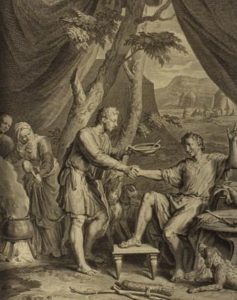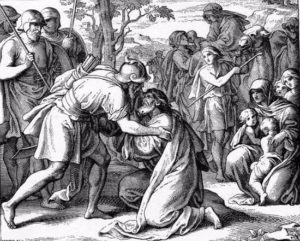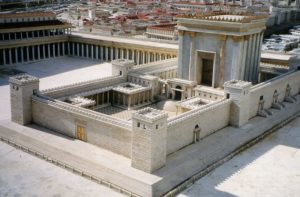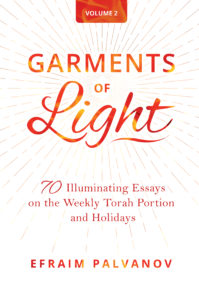Where did Judaism, as we know it, come from?
Tag Archives: Hasmonean
How Esau Became Rome
In this week’s parasha, Toldot, we are introduced to the twin sons of Isaac: Jacob and Esau. The Torah tells us that the boys grew up and Esau became a “man of the field” while Jacob was “an innocent man sitting in tents” (Genesis 25:27). In rabbinic literature, Esau takes on a very negative aura. Although the Torah doesn’t really portray him as such a bad guy, extra-Biblical texts depict him as the worst kind of person.

A 1728 Illustration of Esau selling his birthright.
Take, for instance, the first interaction between Jacob and Esau that the Torah relates. Esau comes back from the field extremely tired. At that moment, Jacob is cooking a stew. Esau asks his brother for some food, and Jacob demands in exchange that Esau give up his birthright (ie. his status as firstborn, and the privileges that come with that). Esau agrees because “behold, I am going to die” (Genesis 25:32). The plain text of the Torah makes it seem like Jacob took advantage of Esau’s near-fatal weariness and tricked him into selling his birthright. This is later confirmed when Esau says that Jacob had deceived him (Genesis 27:36), implying that Esau never really wished to rid of it.
Yet, the Torah commentaries appear to flip the story upside down. When Esau comes back from the field exhausted, it isn’t because he just returned from a difficult hunt, but rather because, as Rashi comments, he had just come back from committing murder! When Esau says “I am going to die”, it isn’t because he was on the verge of death at that moment, but because he didn’t care about the birthright at all, choosing to live by the old adage of “eat, drink, and be merry, for tomorrow we die”. This is a very different perspective on the same narrative.
Another example is when, many years later, Jacob returns to the Holy Land and Esau comes to meet him. Jacob assumes Esau wants to kill him, and prepares for battle. Instead, Esau genuinely seems to have missed his brother, and runs towards him, “embracing him, falling upon his neck, and kissing him” (Genesis 33:4). Again, some of the commentaries turn these words upside down, saying that Esau didn’t really lovingly kiss his brother, but actually bit him! Rashi’s commentary on this verse cites both versions. He concludes by citing Rabbi Shimon bar Yochai in stating that although Esau, as a rule, hates Jacob, at that moment he really did love his brother.
So, how bad was Esau really?
Seeing the Good in Esau
Occasionally, we read about Esau’s good qualities. The Midrash (Devarim Rabbah 1:15) famously states that no one honoured their parents better than Esau did. This is clear from a simple reading of the Torah, too, where Esau is always standing by to fulfil his parents’ wishes. For instance, as soon as he learns that his parents are unhappy with his choice of wives, he immediately goes off to marry someone they might approve of (Genesis 28:8-9).
We should be asking why his parents didn’t simply tell him from the start that his original wives were no good? Why did they allow him to marry them in the first place? If Esau really was the person who most honours his parents, he would have surely listened to them! We may learn from this that Esau’s parents didn’t put too much effort into him. It’s almost like Rebecca gave up on her son from the moment she heard the prophecy about the twins in her belly. The Torah says as much when it states, right after the birth of the twins, that “Isaac loved Esau because his game-meat was in his mouth, but Rebecca loved Jacob.” (Genesis 25:28) Rebecca showed affection to Jacob alone, while Isaac’s love for Esau was apparently conditional. Of course, children always feel their parents’ inner sentiments, and there is no doubt Esau felt his parents’ lack of concern for him. Is it any wonder he tried so hard to please them?
From this perspective, one starts to feel a great deal of pity for Esau. How can anyone read Esau’s heartfelt words after being tricked out of his blessing and not be filled with empathy?:
When Esau heard his father’s words, he cried out a great and bitter cry, and he said to his father, “Bless me, too, O my father! …Do you not have a blessing left for me?” (Genesis 27:34-36)
Esau was handed a bad deal right from the start. He was born different, not just in appearance, but with a serious life challenge. He was gifted (or cursed) with a particularly strong yetzer hara, from birth. His fate was already foretold, and his parents believed it. They invested little into him. And it seems all he ever wanted was to make them proud.
Incidentally, this is one of the major problems with fortune-telling, and why the Torah is so adamant about not consulting any kind of psychic. The psychic’s words, even if entirely wrong, will shape the person’s views. It is very much like the Talmud’s statement (Berakhot 55b) that a dream is fulfilled according to how it is interpreted. A person believes the interpreter, and inadvertently brings about that interpretation upon themselves. It’s a self-fulfilling prophecy.
Who knows what might have happened if Rebecca never bothered to consult a prophet about her pregnancy? After all, Jewish tradition is clear on the fact that negative prophecies do not have to come true. God relays such a prophecy in order to inspire people to change, and thus avert the negative decree. Such was precisely the case with Jonah and his prophecy regarding Nineveh. The people heard the warning, repented, and the prophecy was averted.
Perhaps this is what Isaac and Rebecca should have done. Instead of giving up on Esau, they should have worked extra hard to guide him in the right direction. (Isaac indirectly did the opposite, motivating his son’s hunting since he loved the “game-meat in his mouth”.) The Sages affirm that Esau was not a lost case, and state that had Jacob allowed his daughter Dinah to marry Esau, she would have reformed him (see, for example, Beresheet Rabbah 76:9).
At the end, Jacob returns to the Holy Land and, instead of the war with Esau that he was expecting, his brother welcomes him back with open arms. He weeps, and genuinely misses him. Esau has forgiven his brother, yet again, and buries the past. He hopes to live with his brother in peace henceforth, and invites him to live together in Seir. Esau offers to safely escort Jacob and his family. Jacob rejects the offer, and tells Esau to go along and he will join him later (Genesis 33:14). This never happens. Jacob has no intention to live with Esau, and as soon as his brother leaves, Jacob a completely different course. Esau is tricked one last time.
We only hear about Esau once more in the Torah. When Isaac dies, Esau is there to give his father a proper burial (Genesis 35:29). In fact, the Book of Jubilees, which doesn’t portray Esau too kindly either, nonetheless suggests that Esau had repented at the end of his life. There we read that it was his sons that turned evil, and even coerced him into wrongdoing (37:1-5). In Jubilees, Esau tells his parents that he has no interest in killing Jacob, and loves his brother wholeheartedly, more than anyone else (35:22). He admits that Jacob is the one that deserves the birthright, and a double portion as the assumed firstborn (36:12).
The Torah never tells us what ends up happening to Esau. The Midrash states that he was still there when Jacob’s sons came to bury their father in the Cave of the Patriarchs. Esau tried to stop them, at which point Jacob’s deaf grandson Hushim decapitated him. (A slightly different version is found in the Talmud as well, Sotah 13a.) Esau’s head rolled down into the Cave of the Patriarchs, while the rest of his body was buried elsewhere. Perhaps what this is meant to teach us is that while Esau’s body was indeed mired in sin, his head was completely sound, and he certainly had the potential to be a righteous man—maybe even one of the forefathers, hence his partial burial in the Cave of the Patriarchs.
At the end of the day, Esau is not so much a villain as he is a tragically failed hero.
Why Did Esau Become so Evil?

Esau meets Jacob, by Charles Foster (1897)
As we’ve seen, the Torah itself doesn’t portray Esau as such a bad person. Conversely, one of the 613 mitzvot is “not to despise an Edomite, for he is your brother.” (Deuteronomy 23:8) The Torah reminds us that the children of Israel and the children of Esau (known as Edomites) are siblings, and should treat each other as such.
Nearly a millennium later, the prophet Malachi—generally considered the last prophet and, according to one tradition, identified with Ezra the Scribe—says (Malachi 1:2-3):
“I have loved you,” says Hashem, “Yet you say: ‘How have You loved us?’ Was not Esau a brother to Jacob?” says Hashem, “yet I loved Jacob, but Esau I hated…”
The text goes on to differentiate between Israel and Edom, stating that while Israel will be restored, Edom will be permanently extinguished. We have seen this prophecy fulfilled in history; Israel is still here, of course, while Edom has long disappeared from the historical record. Jacob’s descendants continue to thrive, while Esau’s are long gone.
By the times of the Talmud, there were no real Edomites left, so the Sages began to associate Edom with a new entity: the Roman Empire. The Sages certainly didn’t believe that the Romans were the direct genetic descendants of Esau, but rather that they were their spiritual heirs. Why did the Sages make this connection?
I believe the answers lies with King Herod the Great.
Recall that approximately two thousand years ago Herod ruled as the Roman-approved puppet king of Judea. He was a tremendous tyrant, and is vilified in both Jewish and Christian tradition. The Talmud (Bava Batra 3b-4a) relates how Herod slaughtered all the rabbis in his day, leaving only Bava ben Buta, whom he had blinded. Later, Herod had an exchange with Bava and realized how wise the rabbis were:
Herod then said: “I am Herod. Had I known that the Rabbis were so circumspect, I should not have killed them. Now tell me what amends I can make.”
Bava ben Buta replied: “As you have extinguished the light of the world, [for so the Torah Sages are called] as it is written, ‘For the commandment is a light and the Torah a lamp’ (Proverbs 6:23), go now and attend to the light of the world [which is the Temple] as it is written, ‘And all the nations become enlightened by it.’” (Isaiah 2:2)

A model of Herod’s version of the Second Temple in Jerusalem
Herod did just that, and renovated the Temple to be the most beautiful building of all time, according to the Talmud. It wouldn’t last long, as that same Temple would be destroyed by his Roman overlords within about a century.
What many forget is that Herod was not a native Jew, but an Idumean. And “Idumea” was simply the Roman name for Edom. Herod was a real, red-blooded Edomite. (Though it should be noted that the Idumeans had loosely, or perhaps forcibly, converted to Judaism in the time of the Hasmoneans.) Herod took over the Jewish monarchy, and began the horrible persecutions that the Roman Empire—of which he was a part—was all too happy to continue. It seems quite likely, therefore, that the association between Edom and Rome began at that point. The people resented that Roman-Edomite tyrant Herod that persecuted them so harshly.
Henceforth, it was easy for the Sages to spill their wrath upon Edom, and their progenitor Esau. Esau became a symbol of the Roman oppressor. “Esau” and “Edom” were code words, used for speaking disparagingly about Rome to avoid alarming the authorities. Indeed, when the Sages speak about the evils of Esau, they are often really referring to the evils of the Roman Empire. It is therefore not surprising that Esau becomes possibly the most reviled figure in the Torah—as the Romans were unquestionably the most reviled entity in Talmudic times.
The above is an excerpt from Garments of Light, Volume Two. To continue reading, get the book here!
Yom Ha’Atzmaut: Uniting the Secular and the Religious
The 5th of Iyar is Yom Ha’Atzmaut, Israel’s Independence Day. It was on this day in 1948 that David Ben-Gurion proclaimed the establishment of the State of Israel. Immediately, the armies of three neighbouring Arab states—Egypt, Jordan, and Syria—declared war and invaded. Iraq and Saudi Arabia sent in additional forces. Lebanon assisted them, too. Yemen, Pakistan, and Sudan sent even more fighters. On top of that, there were fighters of the Holy War Army, essentially a local Arab militia composed of over 1,300 troops, as well as the Arab Liberation Army, with over 6,000 troops from various Arab states. Despite being completely surrounded, outnumbered, and outgunned, the nascent State of Israel miraculously destroyed its enemies in just under ten months.
The miracles did not stop there. In 1967, Egypt, Syria, Jordan, and Iraq amassed 550,000 troops to “drive Israel into the sea.” With less than half of those numbers, Israel launched a pre-emptive strike that decimated the Arab forces in six days. Jerusalem was reclaimed, allowing Jews to visit their most holy sites for the first time in centuries. The miracles continued through the Yom Kippur War of 1973, and even through the 1991 Gulf War (which Israel did not directly take part in), and continue to this day. Ben-Gurion’s famous words are fitting: “In Israel, in order to be a realist, you must believe in miracles.”
Despite the fact that Jews once more have an independent state that is strong and prosperous (for the first time since the Maccabees defeated the Greeks and established the Hasmonean kingdom over 2000 years ago) there have been some, particularly in the Ultra-Orthodox Jewish world, that have opposed the State. This opposition comes in various degrees, from those that simply don’t support the secular government; to those that refuse to participate in state programs, military or national service, and the like; to those that completely side with anti-Israel groups bent on annihilating the State. Although, of course, the State of Israel is far from perfect, and its secularization often takes reprehensible forms, opposing the State makes little sense, particularly in light of what Jewish holy texts tell us.
Meanwhile, the ultra-secular elements in Israel, who strive to expunge Judaism, make even less sense, considering that the only claim Jews have to the land is tied to the Torah—the fact that God gave us this land, and we are its indigenous people, inhabiting it since Biblical times. Without the Tanakh, what claim does a secular person have to live in Israel? Moreover, many secular Israelis are blinding themselves to the miracle that is Israel, failing to see God’s hand in every step of its history.
By properly exploring Israel’s miraculous existence, perhaps the gap between the secular and the religious may be bridged. The former can come to see the validity and truth of God and His Torah, while the latter can come to see the State of Israel as a fulfilment of Biblical prophecy.
Prophecy Fulfilled
A look through history makes it clear: if it were not for God’s incredible miracles, the State of Israel would have never gotten off its feet, nor would it have survived to this day. God promises us in the Torah that “five of you shall chase a hundred, and a hundred of you shall chase ten thousand; and your enemies shall fall before you by the sword.” (Leviticus 26:8) This is precisely what has happened in every single war that Israel has participated in. In 1948, Israel tragically suffered 6,000 casualties, while the Arabs suffered over 20,000. In 1967, Israel suffered as many as 983, but the Arabs over 24,000. In 1973, Israel was surprise-attacked on Yom Kippur, completely unprepared for battle, faced with an invasion that had over one million troops from literally all over the world, including nearly 4,000 from Cuba! In comparison, Israel had 400,000 at best, reservists included. The highest estimates place 2,800 Israeli casualties, compared to 20,000 for the attackers.
In one well-known incident from this war, 150 Syrian tanks went up against just 7 remaining Israeli tanks left with no ammo in the “Valley of Tears” of the Golan Heights. Just as Israeli commander Avigdor Ben-Gal prepared to send a message saying his forces could no longer hold on, the Syrians suddenly retreated in a panic. All in all, Israel lost around 60 tanks in the Valley of Tears; the Syrians lost over 500. To this day, military analysts are puzzled by the Syrian withdrawal. Many theories have been proposed, including that the Syrians thought it must be an ambush, or even that higher up in the government Israel had threatened Syria with a nuclear strike. One Syrian soldier would later reveal what may have been the real reason: they thought they had been swarmed by an army of angels!
It isn’t just in military victories that God has clearly blessed the State. In under 70 years, Israel has flourished and is among the most developed and prosperous countries in the world. Isaiah prophesized:
The wilderness and the parched land shall be glad; and the desert shall rejoice, and blossom as the rose. It shall blossom abundantly, and rejoice… they shall see the glory of Hashem, the excellency of our God. (Isaiah 35:1-2)
Indeed, Israel and its once-parched lands have blossomed abundantly. Israel is now self-sufficient in its food production (meaning no one will starve if Israel stops all imports of food) and exports over $1.3 billion in food every year.
Israel famously exports a great deal of innovation and technology, too, and is a global leader in science. Its high-tech sector, nicknamed “Silicon Wadi”, is second only to Silicon Valley. Despite its short existence, Israel ranks 12th in per capita Nobel Prizes—higher than Canada and the US, Germany, France, and the entire European Union for that matter. There are nearly 400 million Muslim Arabs across 22 countries, and altogether they account for just 7 Nobel Prizes (of which two were “peace” prizes for terrorist-sponsors Anwar Sadat and Yasser Arafat!) while some 6 million Jews in Israel alone have won 12 Nobel Prizes. There is no doubt that Israel, with God’s blessing, has lived up to the Biblical ideal of being a “light unto the nations.” (Isaiah 42:6)
History makes it clear that the establishment and survival of the State of Israel is nothing short of a divine miracle, and would not happen were it not for God’s support and supervision. Before Moses passed away, he sang his final song to the people, and told them: “Remember the days of old, understand the years of past generations.” (Deuteronomy 32:7) Consider the historical facts: does history not make it so plainly obvious? “How could one chase away a thousand… if not for Hashem who delivers them up?” (Deuteronomy 32:30) Is it logical that 7 tanks can scare off 150? That a million invaders can be subdued by mere thousands? That a nation so soon back from the brink can rebuild such a prosperous state in a barren desert so quickly? And that it was all prophesied long ago, as Ezekiel foresaw that “in the End of Years” the Jews people shall return to their land, coming back from “the sword, gathered from among many peoples, [returning] upon the mountains of Israel, which have been a continual waste…” (Ezekiel 38:8) Is it not obvious that God is pulling the strings?
Uniting in Righteousness
Finally, the Torah also tells us a well-known principle: the land of Israel is holy, and “vomits out” anyone who does not deserve to live there. In light of this, the great Moroccan sage Rabbi Avraham Azulai (c. 1570-1643) wrote in his Chessed L’Avraham (Ma’ayan 3, Nahar 12):
And you should know, every person who lives in the Land of Israel is considered a tzadik, including those who do not appear to be tzadikim. For if he was not righteous, the land would expel him, as it says “a land that vomits out its inhabitants.” (Leviticus 18:25) Since the land did not vomit him out, he is certainly righteous, even though he appears to be wicked.
Thus, as a general rule, all Israelis—secular and religious—are deemed righteous in their own way, and for any one side to label the other as “wicked” is incorrect. We mustn’t forget that the Holy Temple was destroyed because of sinat hinam, baseless hatred and incessant infighting. Instead of opposing one another, we should all strive to support one another, to understand each other, and make Israel—the one homeland that we all have—the best that it can be. Then we will be able to realize the prophecy of Isaiah:
I will set your stones in fair colours, and lay your foundations with sapphires. And I will make your pinnacles of rubies, and your gates of carbuncles, and all your border of precious stones. And all your children shall be disciples of God, and great shall be the peace of your children… (Isaiah 54:11-13)
The above is an excerpt from Garments of Light, Volume Two. Get the book here!

